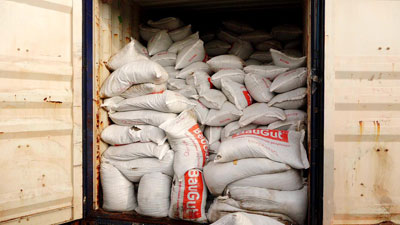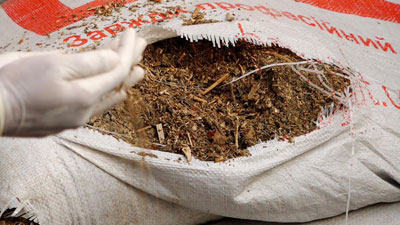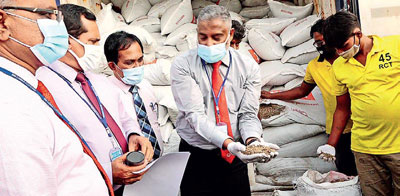News
Agriculture waste instead of coriander: Local traders say they were duped by Ukraine company

The consignment of agriculture waste.
Smarting over allegations levelled against them, Sri Lanka’s coriander importers are accusing an Ukrainian company of defrauding them and sending 28 containers of agriculture waste instead of the spice they ordered.
Essential Food and Commodities’ Importers and Traders Association (EFCITA) president G. Rajendran told the Sunday Times that three out of seven traders had already been duped of 250,000 USD the amount they paid for what they were told would be coriander. “Corresponding banks have however confirmed that they have seized the money in the exporter’s account until the completion of investigations,” he said. The local traders are counting on government intervention both by Sri Lanka and Ukraine to recover the money.
He added that a perusal of documentation revealed that the bill of lading (B/L) used to get the traders to deposit the money in the exporter’s account had been a forgery. The bill of lading is a document that is generally issued by the carrier, the shipping company in this case, that acknowledges the receipt of cargo for a shipment. An exporter will usually obtain this receipt on handing over of goods to the shipping company and then send this to the bank as proof in order to be eligible to receive payment for the goods. In this case, Agronika has avoided paying the freight and forwarded a forged B/L to the importers in Sri Lanka who then made the preliminary payment. Why the shipping company went ahead with the transportation of goods based on a forged B/L is a question that is still unanswered.
 “The traders have done nothing illegal and the Customs know this,” said Mr. Rajendran who holds that the local traders were the victims of the situation. The legal process has begun on the importers’ end and a lawyer representing all seven of them is in the process of trying to recover the monies and send back the consignment of waste.
“The traders have done nothing illegal and the Customs know this,” said Mr. Rajendran who holds that the local traders were the victims of the situation. The legal process has begun on the importers’ end and a lawyer representing all seven of them is in the process of trying to recover the monies and send back the consignment of waste.
The waste was initially seized at a container yard in Orugodawatta. The consignment had arrived in two batches with eight containers arriving in Sri Lanka on December 10 and 20 containers arriving on December 21. The containers that were declared to be ‘whole coriander seeds’ had turned out to be agricultural waste including foliage clippings etc. The value of the consignment stood at approximately Rs. 75 Mn without customs duty. Samples of the waste are to be sent to the Government Analyst Dept. and the University of Peradeniya.
Sri Lanka’s primary sources of coriander are mainly from Bulgaria and Romania for the past five years with a smaller percentage coming from Canada and Morocco. In this instance the primary requirements of aroma and price had been fulfilled in a summer harvest in Crimea which had resulted in the importers’ switching to Ukrainian coriander. Indian corriander, while high in quality, is expensive.
Sunil Jayarathna, spokesman for Sri Lanka Customs told the Sunday Times that investigations had not been started as offices were closed for the holidays and they will begin tomorrow
He said he could not reveal the names of the importers as the investigations were ongoing. Legal action would depend on the results of the investigation as the importers are insisting that they have been duped. If investigations prove otherwise, action will be taken against them under Section 12.43 of the Customs Ordinance. Mr. Jayarathna also noted that the Sri Lanka customs currently used state-of-the-art scanners for their inspection purposes.
Meanwhile the Centre for Environmental Justice has sent a Right to Information application to the Sri Lanka Customs on the matter.
Director Hemantha Withanage noted that legal action filed over the matter of bio-medical waste from the UK, earlier this year, was withdrawn under the condition that the Sri Lanka Customs and the Central Environmental Authority proceed with their legal actions and that the 130 containers would be sent back. However, documentation that the Sunday Times obtained from the Sri Lanka customs shows that only 30 of the waste containers have been sent back. “We don’t have a lot of faith in the authorities’ ability to deal with this since they have failed to adequately do so in the past,” said Mr. Withanage.

Officials inspect the waste.

